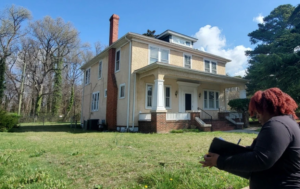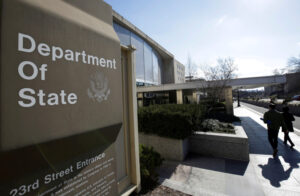As the 2024 Public Policy and Nuclear Threats Boot Camp commences, Mike Albertson, deputy director for the Center for Global Security Research at the Lawrence Livermore National Laboratory, reflects on what it means to work in such an “interesting” field and imparts his advice on the next generation of nuclear policy leaders and their mentors.
Engagement on nuclear topics has changed dramatically over my professional life. When I started twenty years ago working as an analyst on Russian nuclear issues, senior-level interest in the field was low. The United States was deeply engaged in Iraq and Afghanistan. The primary U.S. focus was counterterrorism and conventional dominance. A declining Russian nuclear force was not seen as worthy of further arms control attention. The Chinese nuclear force was small and was expected to remain so. North Korea and Iran would be solved via international cooperation.
Opportunities for young nuclear professionals to engage with mentors or learn the subject matter were limited.
Today, the challenges and opportunities in the field are many. Nuclear expertise and analysis are in high demand. Russia, China, Iran, and North Korea are in the news for all the wrong reasons, and arms control has eroded or vanished in many key areas.
New challenges have brought increasing engagement. Nuclear experts travel all over the world to participate in conversations. Senior-level officials read fresh analysis with great interest. Think tanks and national laboratories host a wide variety of visitors looking to get smart quickly on the subject. Organizations have devoted significant time and resources to next-generation programs to bring new people into the field.
In all of these engagements, I am constantly asked “what do you think” about the latest nuclear headlines or topic of discussion. The answer I invariably give off the cuff is simple: “it’s really interesting—here’s why…”
To me, “interesting” is a sincere thing to say for a couple of reasons. First, there are a lot of difficult problems in the nuclear world which may never be solved—that’s what makes them interesting. From understanding interactions between nuclear armed states and achieving the many varieties of deterrence, to ensuring arms control, non-proliferation, and the peaceful use of nuclear energy—these are all interesting problems without easy solutions.
Second, there is now much more room for creative thinking than in the past. Longstanding approaches or ways of thinking about nuclear security have eroded or disappeared. Established certainties are giving way to deep conversations and new ideas. And nuclear issues are no longer off on their own island—they are now an integral component of most geopolitical discussions.
Third, the conversation is more vibrant and diverse, mixing U.S. and allied experts, experts from other domains, seasoned veterans, and emerging professionals. All of this makes for a more engaging discussion.
Yet eyebrows tend to go up when I use the word “interesting.” The word delivers more positive connotations than the questioner was expecting. “Interesting” implies importance and future investment—the topic is worthy of one’s time and attention. And it conveys hope—“interesting” means “I want to help solve or ameliorate the problem, and I think I can do that.”
Interesting Times Can Be Hopeful as Well
People expect me to reply with a word a little darker, like “worried” or “scared.” The opening paragraphs of most national security articles emphasize the dangers we face. Nuclear weapons based on their destructive power are already scary things. Like the media, the national security community tends to catastrophize—this tendency is often well-intentioned, meant to convey the seriousness of these risks so people will pay attention. But catastrophizing leaves a false impression of hopelessness, despite the fact that policymakers are hard at work addressing these issues, that useful dialogues are taking place with allies and adversaries around the world, and that important new ideas are being generated by the nuclear expert community.
As the saying goes, living in interesting times is both a blessing and a curse. Non-interesting times can be peaceful but boring; interesting times can be both stimulating and calamitous. Interesting times are full of risks—but they are also full of hope as renewed interest drives a new generation to find solutions to an era’s most challenging problems.
An Interesting—and Growing—Field
“Interesting” is drawing people in. A large and diverse group of younger experts is gravitating toward nuclear policy. They want to learn and do meaningful research—they also want to carve out fulfilling careers in this field. There likewise remains a small but strong cadre of deeply experienced nuclear experts, many of whom devote significant time and energy to mentoring this next generation.
Despite the many unjustly given pejoratives about the “nuclear priesthood,” you’ll find many of these priests outside of the cathedrals trying to bring a new generation into the field. And contrary to assertions, there’s a decent number of mid-career nuclear experts serving as a bridge between these two generations. Mid-career professionals come with experience and credentials, bringing curiosity and a continued desire for growth while still remembering what it’s like to start out in this field.
Nuclear policy engagements like the Public Policy and Nuclear Threats (PPNT) Boot Camp bring these generations and perspectives together on a regular basis. With many more now getting the opportunity this summer to actively engage on nuclear topics—whether through summer positions or in immersive programs like PPNT—we have an important opportunity to get more ideas and solutions into the nuclear field at this interesting moment. This opportunity is a two-way street both for participants and presenters.
For the Next-Generation of Nuclear Thought Leaders
Listen and Learn
Those entering the field should seize the opportunity to listen and learn. Many of these programs did not exist a short time ago. Absorb as much as possible in this short amount of time. Some of the information may have immediate relevance to a project or paper; some of it may become useful further down the line. Take full advantage of the opportunity to learn a great deal quickly, either in the big conference room or in informal settings like lunch or a coffee break.
Keep an Open Mind
There are many bureaucratic cultures and tribes in the nuclear field. You will be exposed to many over a long career. Avoid stereotyping a speaker or participant based on their age, their partisan or institutional affiliation, their work experience, or what you have read from them or about them. Very few things are absolute truths—either factual or moral—in this field. Information about capabilities and intentions is incomplete. Empirical data is lacking. Debates are longstanding. Remember that compromise is almost always required to get big things done, so it is best to think about where ideas overlap rather than where they diverge.
Ask Good Questions
The best opportunities will offer plenty of chances to find your voice and engage in the conversation. Take advantage of them in the right way. Ask speakers to elaborate on a point you find particularly interesting, to comment on a hard problem, or to provide a topical story to show how an issue works in the real world. If you want to challenge a point, do so respectfully and use the engagement to learn rather than to convince or play to the crowd. Sometimes the best questions are very short ones aimed at just the right point.
Pick Interesting Projects
There is a vast number of relevant and interesting research projects to pursue in the nuclear field. Senior policymakers, military leaders, and allied and partner governments are all looking for work to be done exploring these problem sets. But there is an unfortunate tendency to re-examine already overexamined issues with yet another new methodology or data set. Another is to focus on an overcomplicated question or methodology rather than focusing on the potential findings, leading a nuclear practitioner to quickly dismiss your work. Pick something that is interesting to you and relevant to the reader. Highlight up front why the issue matters. Make it readable to both an expert and an outsider. Leverage your unique skills to gather and analyze data to provide new perspectives.
Make Lasting Connections
Any professional community of national security expertise is a small one. Those I work with closely now, we all came up together doing many of these same programs or working in the same offices over the last twenty years together. You will run into the same people over and over. You can form lasting friendships from events like PPNT, and end up at the same conferences or on the same panels over the years. People here could end up being your boss, or decide whether you come into their institution. Make friends, engage constructively with your potential future co-workers or co-panelists, and avoid making lasting enemies over minor intellectual disagreements.
For Their Mentors and Teachers
Test New Ideas Out
For those participating as briefers or mentors, these programs are likewise a learning opportunity. As a young professional eager to learn, there is nothing more stultifying than listening to a seasoned expert going through the motions on a well-worn briefing that may have grown out of date or out of touch. Use the summer to update your presentations in line with changing events in the world. Try out new arguments with a different audience. Be honest about what you do not know, or where you have gaps or biases. Ask for feedback.
Engage in Two-Way Conversations
Everyone says they want to have voices from the next generation in the room, but those voices will want to engage and ask hard questions. They will challenge findings and assumptions, sometimes less tactfully than you experience in other settings with your peers or subordinates. These engagements can be useful for sharpening talking points, identifying blind spots or areas of confusion, clarifying your argument, and coming up with ideas for future papers.
Provide Interesting Ideas for Future Work
Given the vast array of challenges, someone starting off in the field may find it difficult to focus on the right topic, to establish the proper scope or level of ambition for a project, or identify potential publication venues. All of us have topics we find interesting but do not have the time to research ourselves. Presenters can be instrumental in helping focus the time and attention of emerging scholars in directions where they can make a positive difference.
Give Hope
As bad as things may seem compared to ten or thirty years ago, try to end on a positive note rather than impressing upon the audience that the topic is a lost cause. Provide ideas for future work. Note that every moment has its national security crises and debates. Present historical analogies where predictions were wrong in a positive direction. Demonstrate that the severity of the situation means more opportunities for meaningful work.
Hope is what ultimately inspires the interest that brings a new generation into the nuclear policy fold. Good mentors should ensure that this next generation’s interest in creating positive change will remain with them for decades to come.
Mike Albertson is the deputy director for the Center for Global Security Research at the Lawrence Livermore National Laboratory. The views expressed here are the private views of the author and should not be attributed to the institutions with which he is affiliated.
Thumbnail credit: Cornelius Bartke (Flickr)




